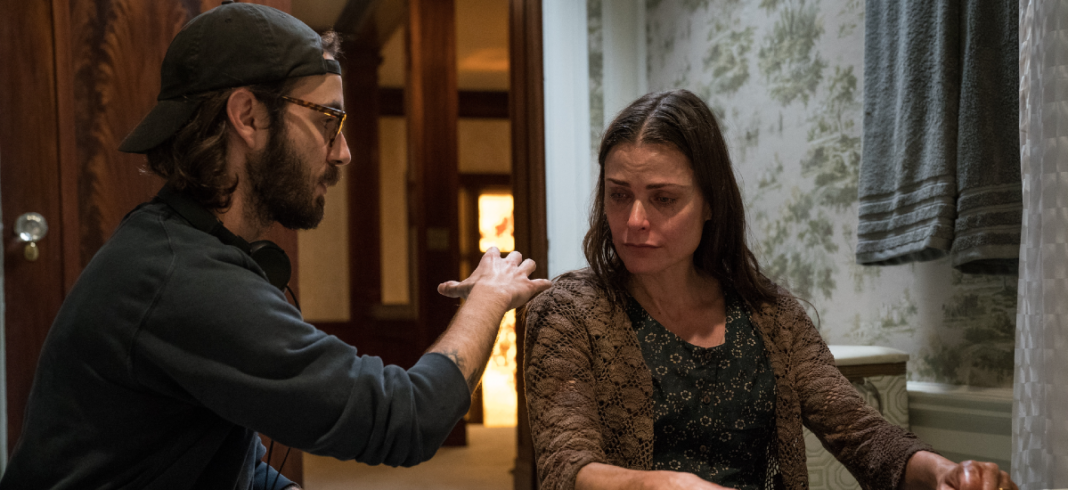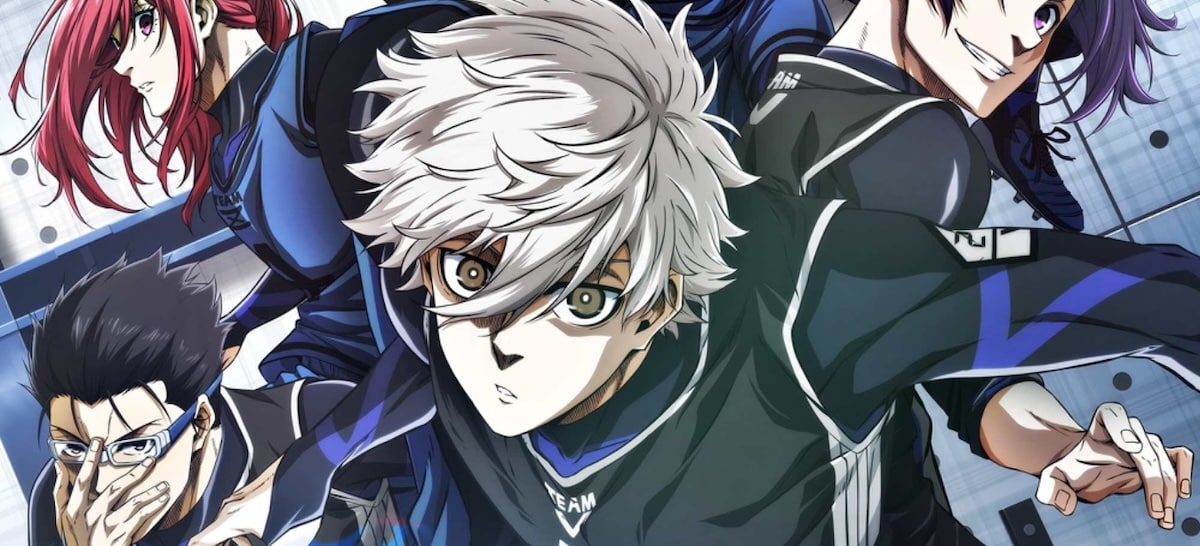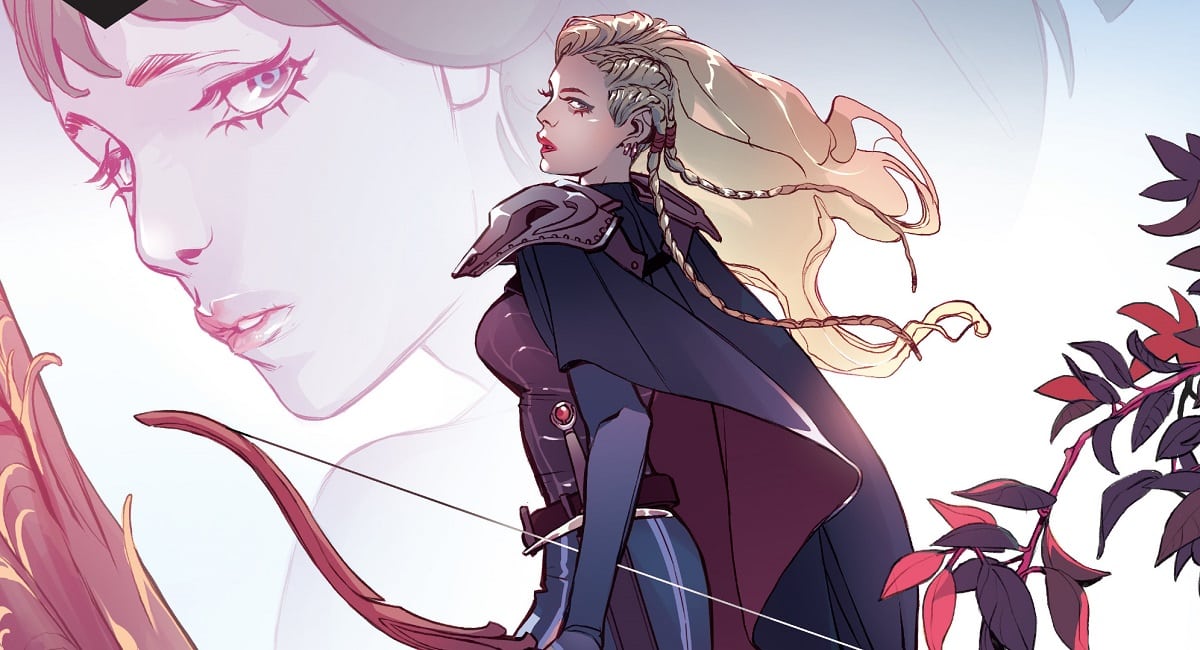For the past four or five years, director Nicolas Pesce has wowed horror and genre fans with his indie movies, The Eyes of My Mother and Piercing. When he was attached to resurrect The Grudge for American horror fans, it seemed like a perfectly natural fit.
Sure enough, Pesce has taken advantage of his reboot/sequel’s R-rating to up the gore factor much higher than some might be expecting. Even so, it’s still very much a sequel to the original J-horror movies directed by Takashi Shimizu in that it follows a number of different characters and stories in a non-linear fashion.
Andrea Riseborough is probably the closest Pesce’s film has to a lead, playing a single mother police detective investigating a series of grisly murders at a house where anyone who enters it ends up seeing horrific things that drive them to kill themselves or others. The “Ju-on” curse is indeed alive and not well, as it messes with other characters played by Jacki Weaver, John Cho, Betty Gilpin, Demián Bechir and more.
Pesce’s movie didn’t do great this past weekend, but that doesn’t mean that we should disregard what Pesce has done as director in trying to be faithful to Takashi’s original canon while making it far gorier than any of the previous films.
The Beat got on the phone with Pesce last Friday as The Grudge was opening nationwide for the following interview.
THE BEAT: How did you get involved with The Grudge? I know that Sam Raimi and Sony had done a few “Grudge” movies in the past. Had Sam seen some of your work and approached you to direct this or did you have to pitch it to them?
Nicolas Pesce: I was pitching a different movie to a producer on the film named Roy Lee, and we were just nerding about J-horror, and I was talking about how much I loved the “Ju-on” films, the Japanese “Grudge” movies. We were talking about them, and he was like, “Oh, you know that we’re actually trying to figure out how to make a new Grudge movie. Do you have any ideas? I thought that when they made the original remakes in 2004, it was a straight-up remake of The Grudge, the Japanese film. What I thought was a missed opportunity was that the franchise as it stands in Japan is an anthology. Every movie is a different story, different set of characters. I thought in this world now where everything is being remade but fans are still hyper-sensitive to canon and the pre-established mythology, rather than remaking the old movies, why don’t we make a new installment into that canon of mythology. I went to Sony and Sam, and I pitched them the idea, and they liked it, and it was history.
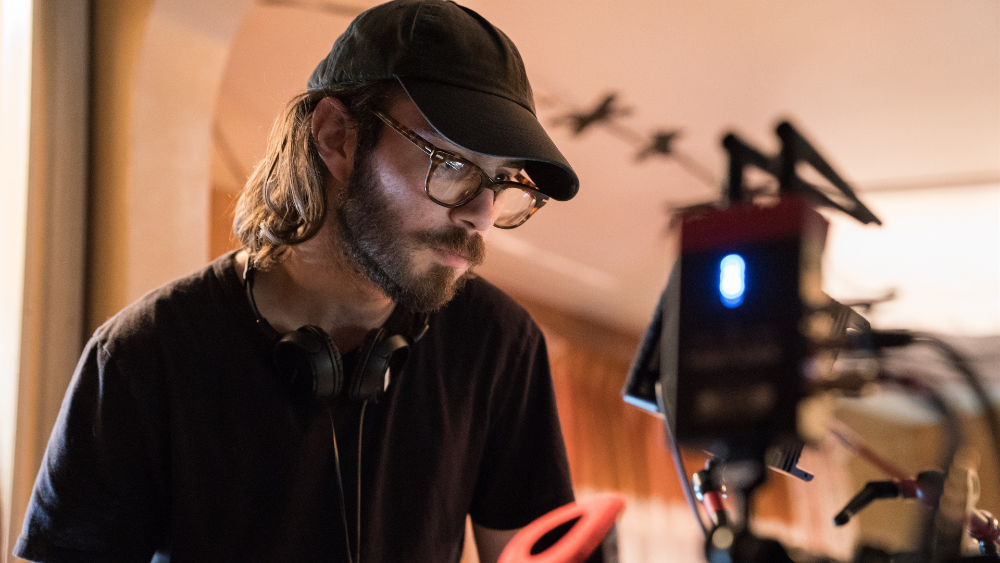
THE BEAT: I was going to ask how big a fan you were of those original movies, so you obviously knew all the Japanese movies beforehand?
Pesce: I’m a very big fan, especially of the Japanese movies, and including the American remakes, there’s twelve “Grudge” movies that predates this one. I just really loved what Shimizu [Takashi] had done with those early films and how there were certain production restraints they had, because of the amount of money they had. As a result, the product was something that felt super-grounded and realistic. It almost felt like home movies where ghosts just happened to walk through the background. It was a movie that it relied so much on atmosphere and tone, and as a filmmaker, those are the things that I really love to play with.
THE BEAT: What was your first meeting with Sam like? He must have been involved fairly early on as well.
Pesce: I think it might have been the first official pitch was to Sam, and once I got over the fanboy nerding out inside of me, he was such a supportive filmmaker. Obviously, because he’s a director first, he has a vision that a lot of people don’t have and was able to really see what I wanted to do with the film. Throughout the whole process, he’s been so unconditionally supportive.
THE BEAT: One of the questions when I first heard you were doing this, I was curious whether you would stay faithful to the original movies, but this pretty much branches off the first movies with the original house. Was there a lot of discussions about how faithful it would stay with the original movies and how much to change for new audiences?
Pesce: I think that’s perpetually the most difficult balance as a film. People get mad when you change too much, and people get mad when you make it the same. I think it’s like finding that middle ground. I think for me, it was about narratively grounding it in the franchise so like you said, we start off with the original house in Japan, and have stories that are told out of order with multiple storylines, interweaving together. It’s a bit of a puzzle. There’s certain images that we knew we wanted to give to the audiences – the hand in the hair, the girl in the bathtub – there were certain moments of the nods to J-horror, but stylistically and tonally, I wanted to make it my own.
THE BEAT: Did they already have a screenplay or something they were developing even before you met with Roy Lee?
Pesce: They were developing something, but at the time of me pitching it, I didn’t read the script. They didn’t give it to me. It was something that was very much a work-in-progress, and I had my own notion of what the movie would be, and so I thought to myself, I’m not going to ask for the script that they’re working on. I’m just going to go in and pitch exactly the movie that I would want to make, and either they want to make it as well, or they want to stick to what they’ve already got in progress, and if so, great. I went in and pitched my version of the movie, totally ignorant of what they were working on, and they liked it so they let me start from scratch and start from there.
THE BEAT: And going in, this was always going to be R-rated? I think one of the criticisms of the first remake was that it was PG-13, so did you feel like you had a little more leeway to play with the gore and stuff like that?
Pesce: I didn’t know what the ratings expectation was, and I just wrote whatever came out of me. The first draft I turned in, the studio looked at me and were like, “This is an NC-17 movie.” [chuckles] I was like, “Okay, well that’s kind of cool, right? That’s pretty hardcore releasing an NC-17 studio movie,” and they were like, “No, we’re not gonna do that.” [laughs] They had initially hoped that it would be a PG-13 movie, because the previous American remakes had been. This has changed over the past couple years, but for the longest time, the assumption was you make more money as a PG-13 movie because teenagers can go see it, but then you look at movies like Itand Get Outand the hits that have been Rated-R, and to me, horror, the genre on the whole, relies a bit on being more hardcore than the other genres. For a proper horror fan, you want something where the intensity threshold is kind of high. We ended up meeting in the middle with an R-rating, and as I was writing, the first It movie came out, and that made the studio feel a little bit better about making an R-rated movie.
THE BEAT: Kids will go see what they want to see. They’ll buy tickets to Cats and then sneak into your movie.
Pesce: Exactly.
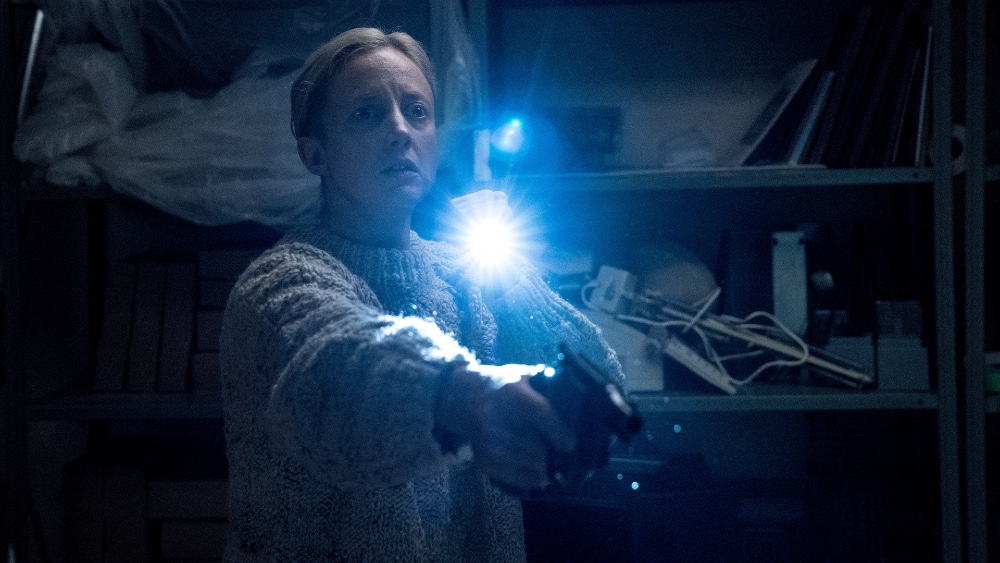
THE BEAT: I would think that if the studio saw your other movies, they’d have expected something very close to NC-17. I’m not sure if you went to the ratings board with either Eyes of my Mother or Piercing, but they’re both pretty intense.
Pesce: Yeah, Eyes of My Mother was an R; Piercing, we had to cut one thing to get it out of an NC-17 rating. To me, as a fan, I think there’s something cool about making an NC-17 movie, but it’s kind of a death sentence for the distributor.
THE BEAT: You can’t advertise movie in most places when it’s NC-17 or only during late night hours. A lot of people have mentioned the cast in this movie, and it is an amazing cast. Obviously, you could have gone the usual horror route of getting all these young, fresh-faced actors, but you have all these veterans like Lin Shaye, Jacki Weaver and Andrea is always amazing. How did you go about putting together the cast with so many characters?
Pesce: It was always my intention to make a very adult film. Right from the get-go, I was not interested in a movie about teenagers running around a high school. The cast was just a product of the nature of the stories. Part of this movie is that, independent of all the supernatural stuff that’s going on, the characters are going through something really difficult and horrifying in their real lives that is only exacerbated by the curse. As a result, there’s a richer palette for all the actors to dig into. John Cho says that if this wasn’t a horror movie, he would never get to make a movie about parents deciding whether or not they’re going to abort their kid or if they did, it would be a Sundance movie. The beauty of horror these days is you can kind of Trojan Horse in all this family drama and put in stories that wouldn’t ordinarily get told at this scale. I think that’s what attracted the actors, and for me, it was about finding just really good actors that could bring this thing to life and make it feel real and really breathe life into all the human drama.
THE BEAT: This is a bit of minor spoiler territory so….
SPOILERS
SPOILERS
SPOILERS
SPOILERS
As far as the storyline you mentioned between John Cho and his pregnant wife [played by Betty Gilpin], was the last scene between them more violent or graphic at some point? I’m sure that could have really disturbed people if it was.
Pesce: You’re talking about their story’s conclusion? The first feature length “Grudge” movie, Ju-on: The Curse, actually ends with the father of the family who is the murder, cutting a pregnant woman open, taking her baby out and smashing it on the street inside a plastic bag. I thought that was one of the most gruesome things I had ever seen and was shocked they could put that in a movie. Initially in writing, their story’s end was not quite that graphic but was a bit more gruesome in that way. As I continued to write the script, there was this feeling I had – especially once we knew that John Cho was going to play Peter – he’s one of these actors that people just naturally like him on screen. They were a very sympathetic story. Him getting cursed was because he tries to help this little girl and that’s what makes him step into the house. These were going to be the characters who were going to be the most relatable and have the deepest connection with the audience. I didn’t want to undermine all that in favor of just a really gruesome end. I think what we ended up is the perfect middle ground where you make the gruesome story in your head, and I don’t need to show it to you. I worried that if I did show it to you, it would just make you hate this guy that you spent the whole movie loving.
[SPOILER ALERT OVER]
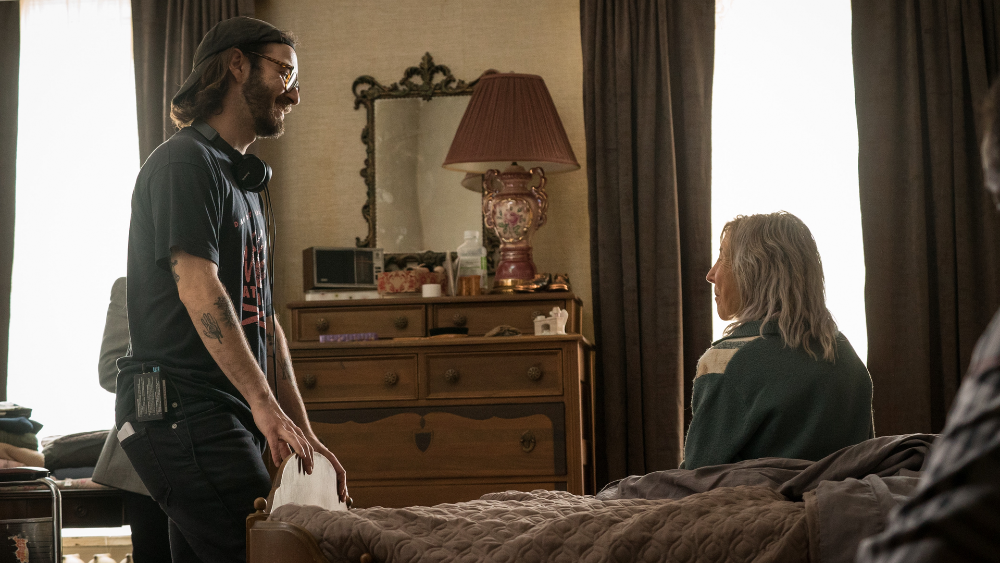
THE BEAT: What’s it like working with Sam as a producer and also Roy Lee, since he’s been doing a lot of studio horror movies, while you come more from the indie world, working with the guys from Borderline Films. What was it like working with Sam on a studio movie?
Pesce: The beauty of Sam is that like me, he started off doing tiny movies. He really understood what the difference for me would be between the smaller movies and something like this. More than anything, I think like I was saying before, he just immediately got what I was going for, and always supported my vision of the movie of the movie and always helped me to better achieve whatever I was going for. He never really asserted, “Oh, I think it should be like this” or “You really need to listen to the studio.” It was always like, “How do we make the best version of the movie that you want to make?” I think it comes from he’s a director, and he knows what he wants in a producer, and he gave that to me. Every step of the way. When you’re on set, you’re shooting something, inevitably there are certain things that don’t work how they work in your head when you put them on their feet. To have someone like Sam to turn to and be like, “Okay, this isn’t working. How do we make this better?” and to have those conversations with a guy like Sam Raimi was incredible.
THE BEAT: Do you have any idea what you want to do next? Do you have other scripts you’ve been working on you might want to do? Would you want to go back to the indie route? What’s the next step?
Pesce: I’ve got a couple of things that I’m working on, all sort of still in the horror realm. I’d love at some point to make an action movie. I’d love to make a sci-fi movie, but I once heard Quentin Tarantino say after he made “Django,” he said, “I finally got to make a Western, and now I know so much better how to make a Western, I don’t want to throw that away and try to make something new again. I want to use what I’ve learned.” I kind of feel the same way. I think a lot of horror directors feel like, “People only want to hire me for horror movies,” which is often the case, but Piercingand Eyes of my Motherare certainly genre movies, but very non-traditional. Even though The Grudge is not your traditional mainstream horror franchise, it definitely is the most traditional movie I’ve made, and there’s so much that I learned about scaring mainstream audiences that I don’t want to necessarily throw out that skill set now. I think I’m just better prepared to do it again, so I want to use the things I’ve learned and make another horror movie that’s even scarier.
THE BEAT: Do you have any inclination to do anything lighter or more comedic? Piercing isn’t particular grim, but the two movies you made on either side of it are pretty grim. It must be tough as a filmmaker to remain in those worlds for so long.
Pesce: Piercing, to me, is a funny movie. It’s definitely dark but it’s a more playful movie, and I love the director Takashi Miike, and I think what he does so well… a lot of the Japanese directors and Korean directors, a lot of the Asian genre cinema, has this way of making really dark stuff that sometimes makes you laugh and makes it even more dark, because you find yourself laughing at shit you wish you weren’t laughing at. I think that’s awesome. I don’t see myself doing a romantic-comedy; I think Piercingis as close to romantic-comedy as I’m going to get. I think in my regular life, I’m a pretty happy-go-lucky, jolly person, and I think there’s something about the dark stuff that just fascinates me. I think that if I was a darker, more tortured person, it would be more difficult to steep myself in this shit. I think it’s interesting that if you look at a lot of stand-up comics, they have really dark lives and are really serious people, and their outlet is comedy. I feel like I’m the opposite. I think there’s something artistically where someone’s output tends to be the other side of them that they don’t get to explore as much. I gravitate, as a fan, to dark movies. There’s just something interesting to me about getting to confront darker thoughts, darker emotions, but in a really safe space.
The Grudge is now playing nationwide.


